The project “Improving Digital Literacy for Vulnerable Communities” is led by Dr Abdul Rohman and Master Vo Thi Diem Trang from the School of Communication and Design, RMIT University Vietnam.
Taking place from June to December 2023 with sponsorship from Traveloka, the main goal of the project is to help people with disabilities access the digital world equally, safely, and achieve maximum benefits.
“In an age where most of us are glued to our mobile phones, laptops, smartwatches or other digital technologies , it is easy to forget that there are people in society who still have limited access to the world around them,” Dr. Rohman stressed.
“People with disabilities often struggle financially when it comes to purchasing digital devices. Apps and devices often lack features that make them easier to use for people with disabilities. Issues around privacy and personal security that arise from the AI era further complicate matters,” he added.
Equip yourself with digital knowledge
Improving Internet connectivity infrastructure and access to digital devices is a logical starting point to closing the current digital divide.
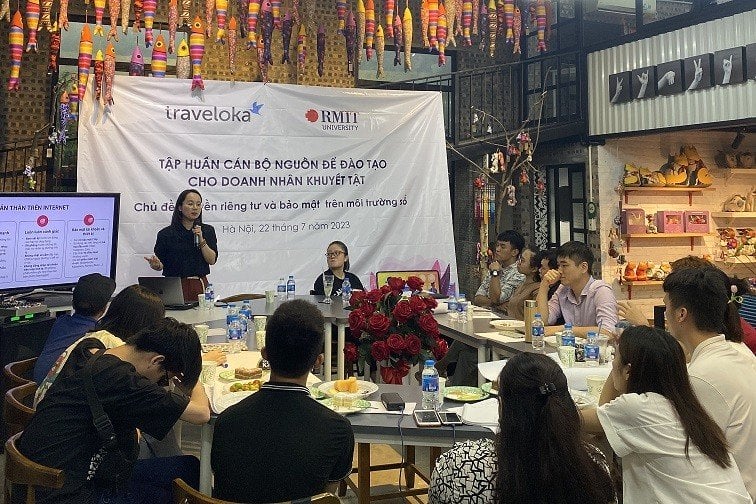 |
| A training session for facilitators with the participation of 12 people with disabilities from Hanoi and neighboring localities in July 2023. (Photo: RMIT project team provided) |
However, an equally important task is to equip people with disabilities with digital skills to protect themselves in the digital space.
“Many people may be indifferent or negligent about protecting personal data, while many people with disabilities do not even have access to such skills, meaning they are at risk by circumstance rather than by personal choice,” said Dr Rohman.
As part of the Digital Literacy for Vulnerable Communities Project, 27 people with disabilities were recruited to participate in Training of Trainers to enhance their knowledge, leadership and community engagement skills, enabling them to disseminate digital literacy skills to other people with disabilities in their local communities.
These “ambassadors” then conducted Training of Communities sessions on digital literacy for nearly 400 other people with disabilities, helping them confidently navigate the digital space, effectively manage their businesses, and protect their online privacy.
Many participants shared their excitement and emphasized that the training session helped them be more vigilant when participating in cyberspace.
A blind person said: “Thanks to the training, I have learned a lot of new knowledge and was quite surprised about online fraud tricks. From now on, I will be more careful when installing applications of unknown origin or sharing personal information on social networks.”
Shaping policy, promoting inclusion
Not only limited to training activities, the project also conducted research based on 35 in-depth interviews with leaders of disabled people's associations and focus group interviews with disabled people living in 23 provinces and cities in Vietnam.
The insights gained were the basis for a series of policy dialogues in Ha Nam, Da Nang, Hanoi and Ho Chi Minh City with the participation of representatives from government ministries and organizations affiliated with local associations of people with disabilities.
During these dialogues, representatives from different stakeholders discussed concerns and challenges regarding technology and their impact on people with disabilities.
Mr. Nguyen Van Quoc, Director of the Da Nang City Smart Information and Control Center, shared his observation that some websites and online platforms of the city’s departments and agencies have integrated disability-friendly features such as font size adjustment, text-to-speech conversion, and audiobooks specifically designed for the visually impaired.
However, such portals are still very few. Therefore, Mr. Quoc called on stakeholders not to ignore the challenges that need to be addressed so that people with disabilities can exploit information technology and digitalization more effectively.
Delegates proposed many feasible solutions to facilitate people with disabilities to access information and use information technology to improve their quality of life.
Nguyen Thu Phuong, a research assistant at RMIT University and member of a disabled people's association in Hanoi, highlighted the positive outcomes from the policy dialogue in Da Nang.
After this dialogue, the City People's Committee quickly sent an official dispatch to relevant departments to learn about and implement the proposed recommendations.
These recommendations include creating a list of hotels, hospitals and restaurants that are accessible to people with disabilities, integrating hospital software with disability-friendly features such as screen readers or sound amplification, etc.
“This shows that open policy dialogues are contributing to progress,” said Phuong. “They can be an effective forum for the voices of people with disabilities to be heard and translated into action to create positive change.”
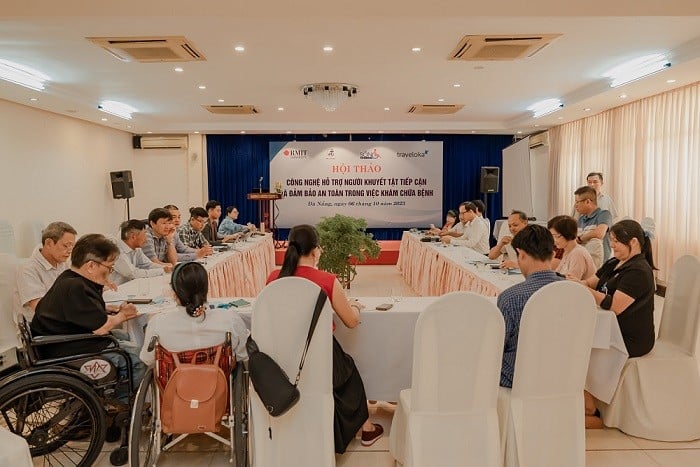 |
| A policy dialogue in Da Nang City in October 2023. (Photo: RMIT project team) |
Next Step: Conquering AI
While progress has been made, the journey to advance progress must continue. As artificial intelligence (AI) becomes increasingly prevalent, the RMIT team emphasises the need to ensure that the technology does not exacerbate discrimination against people with disabilities.
“Like many technologies, AI-based technologies are often inaccessible and expensive for people with disabilities. Those who can access and afford these technologies are often unaware of the trade-offs in terms of their personal data,” said Dr. Rohman.
He assessed that many AI-based technologies are created without considering accessibility for people with disabilities from the design stage to the end-user stage. They also rely on conventional standards for processing data, making people with disabilities even more disadvantaged.
“While the easiest solution is to diversify the input data sources for application development, a more meaningful solution is to invite people with disabilities to participate in every stage of product development – rather than just supporting them as a later requirement,” the expert concluded.
Source





![[Photo] Prime Minister Pham Minh Chinh and Prime Minister of the Kingdom of Thailand Paetongtarn Shinawatra attend the Vietnam-Thailand Business Forum 2025](https://vphoto.vietnam.vn/thumb/1200x675/vietnam/resource/IMAGE/2025/5/16/1cdfce54d25c48a68ae6fb9204f2171a)




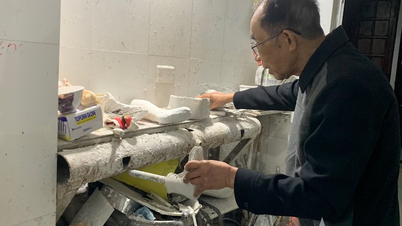

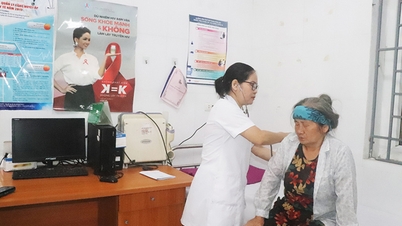

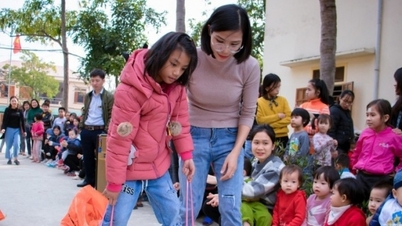

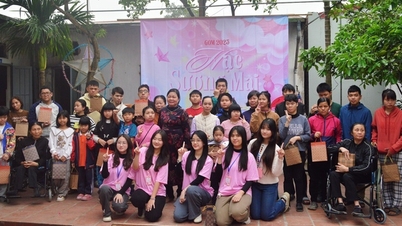

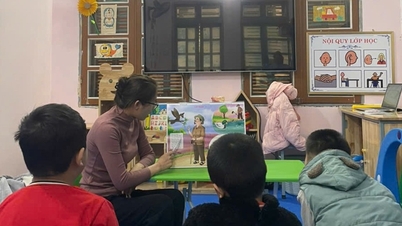



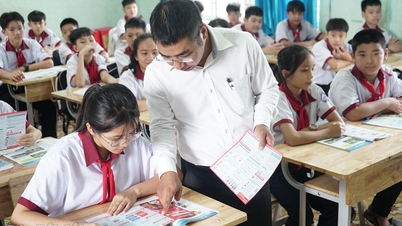








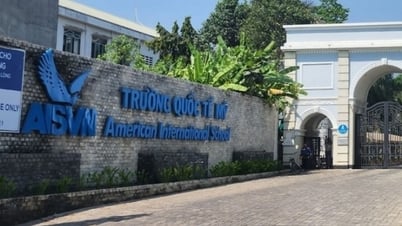
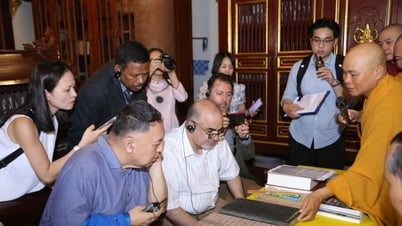
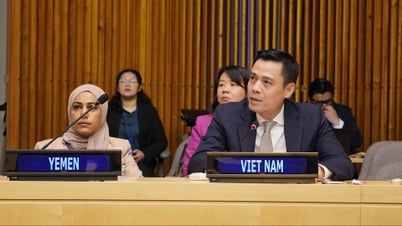
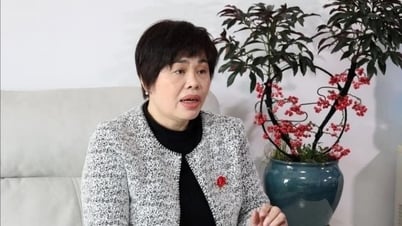

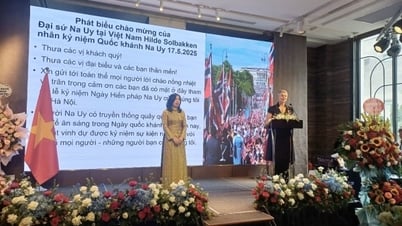
![[Photo] President Luong Cuong receives Prime Minister of the Kingdom of Thailand Paetongtarn Shinawatra](https://vphoto.vietnam.vn/thumb/1200x675/vietnam/resource/IMAGE/2025/5/16/52c73b27198a4e12bd6a903d1c218846)












































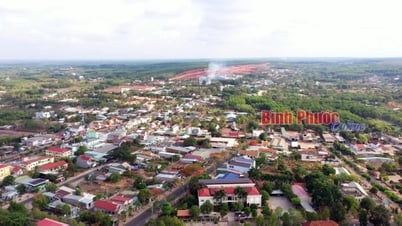






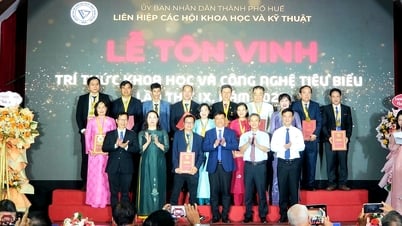












Comment (0)